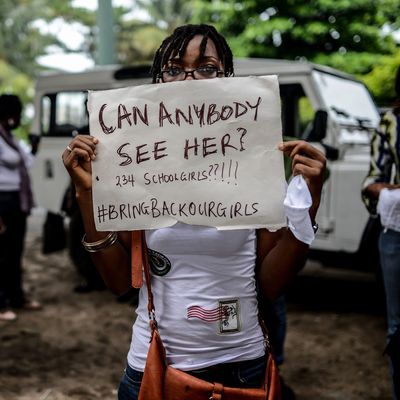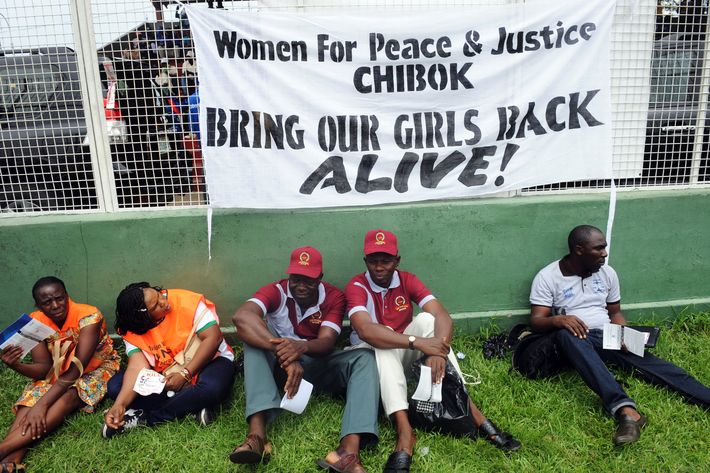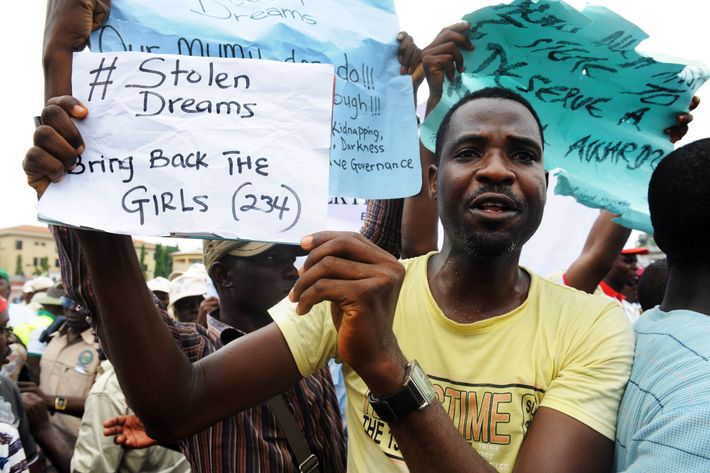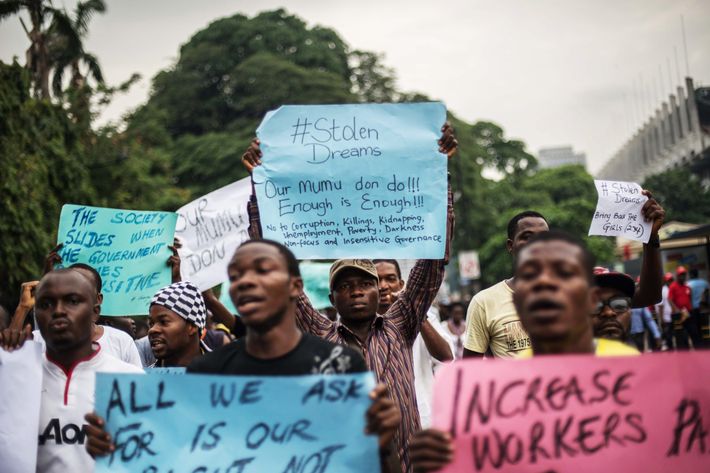
On April 15, more than 200 young women — the exact count varies, as much of the information around this story, from sources official and not, remains uncertain — were taken in the night from a boarding school in Nigeria as punishment for learning. One thing everyone agrees on is that the Islamic group Boko Haram, which believes in Sharia law and terrorizes the region, is to blame.
Days and days later, Nigerians, largely women, are protesting in the street, demanding more government action. The west is just starting to notice. It’s a heartbreaking, tragic story with an ending that will almost certainly be unhappy for most, but the details are worth knowing.

The Abduction
The best place to start is with Alexis Okeowo’s harrowing account in The New Yorker, which begins:
“I thought it was the end of my life,” Deborah Sanya told me by phone on Monday from Chibok, a tiny town of farmers in northeastern Nigeria. “There were many, many of them.” Boko Haram, an Islamist terrorist group, kidnapped Sanya and at least two hundred of her classmates from a girls’ secondary school in Chibok more than two weeks ago. Sanya, along with two friends, escaped. So did forty others. The rest have vanished, and their families have not heard any word of them since.
How can you not keep reading?
The New York Times puts the total number of girls at “roughly 275,” and Hajiya Asabe Ali Kwambula, the principal of the school, said “53 girls had escaped, and that 223 were still missing.”
The captors, described as “armed and uniformed” men with trucks and motorcycles, may have been dressed in stolen uniforms from the Nigerian military, and posed as soldiers taking the girls to safety. The teenagers, up late to study for an exam that had already been postponed owing to threats, only realized they were in danger when “the men started shooting their guns into the air and shouting ‘Allahu Akbar,’” Okeowo reports.
The missing are between 16 and 18 years old, both Christians and Muslims, targeted solely for their participation in a secular education.

About Boko Haram
The name, in a local language, means “Western education is a sin,” CNN reports.
The group especially opposes the education of women. Under its version of Sharia law, women should be at home raising children and looking after their husbands, not at school learning to read and write.
Founded by Mohammed Yusuf, a young cleric, 12 years ago, Boko Haram was designated a terrorist group by the Obama administration last year. (Yusuf was killed in 2009.)
From Human Rights Watch:
Suspected Boko Haram members have carried out hundreds of attacks, including suicide bombings, across northern and central Nigerian since 2009, killing more than 1,600 people. The group has primarily targeted police and other government security agents, Christians, and Muslims working for or accused of cooperating with the government.
At this writing, suspected Boko Haram members had gunned down or bombed worshipers in at least 16 church services in 2012. The group also burned schools, bombed newspaper offices, and assassinated Muslim clerics, politicians, and traditional leaders. In the first 10 months of 2012 alone, more than 900 people died in suspected attacks by the group—more than in 2010 and 2011 combined.
In February, the group “shot or burned to death 59 pupils in a boarding school,” all boys. Last month, there was a bus stop bombing.
Government Response
Local education commissioner Musa inuwa Kubo has said, “This is a delicate situation that requires careful handling. When you have heavily armed men holding close to 200 girls hostage, you have to be very careful in your approach so as not to risk the safety of these girls you want to rescue.” (In 2012, for instance, a rescue attempt led to the killing of two Western engineers who had been kidnapped by Boko Haram.)
A few days after the girls were taken, the military said it had rescued most of them, but took it back after families and the school rejected the claim. As the Times reports, “The military has become notorious for exaggerating its successes against Boko Haram.” From Okeowo:
In the wake of the military’s failure, parents banded together and raised money to send several of their number into the forest to search for the girls. The group came across villagers who persuaded the parents to turn back. They told the parents that they had seen the girls nearby, but the insurgents were too well armed. Many of the parents had just bows and arrows.
“We cannot stop terrorism overnight,” said former British prime minister Gordon Brown, now the U.N.’s special adviser on girls’ education, “but we can make sure that its perpetrators are aware that murdering and abducting schoolchildren is a heinous crime that the international authorities are determined to punish.”

Where Are They Now?
“We have heard from members of the forest community where they took the girls,” said a man whose niece is among the missing, as reported in The Guardian. “They said there had been mass marriages and the girls are being shared out as wives among the Boko Haram militants.”
A Chibok elder told AFP, “From the information we received yesterday from Cameroonian border towns our abducted girls were taken … into Chad and Cameroon,” where they were sold for 2,000 naira, or $12, each.
“They are young men,” said Borno Governor Kashim Shettima of the kidnappers. “And most of these ladies will be turned into their sex slaves and cooks.”
The #BringBackOurGirls Protests
In addition to taking to the streets, the hashtags #BringBackOurGirls and #BringBackOurDaughters have helped bring international media attention to the incident. But the protests are largely aimed at Nigerian’s own ineffective leadership. “We are trying to bring the plight of the Chibok girls to the attention of the government,” said protest leader Hadiza Bala Usman. “We see the Nigerian government not showing enough concern.”
Meanwhile, a U.S. State Department spokesperson has said they are “in discussions with the Nigerian government on what we might do to help support their efforts to find and free these young women.” (The White House petition is here.)
“The escalation of violence in northeastern Nigeria in 2014 has developed into a situation of non-international armed conflict in which all parties are violating international humanitarian law,” said a rep for Amnesty International. “Civilians are paying a heavy price as the cycle of violations and reprisals gather momentum.”
“If this abduction of 236 girls happened anywhere else in the world,” said Usman, the protest organizer, “the nation would be at a standstill.”





























